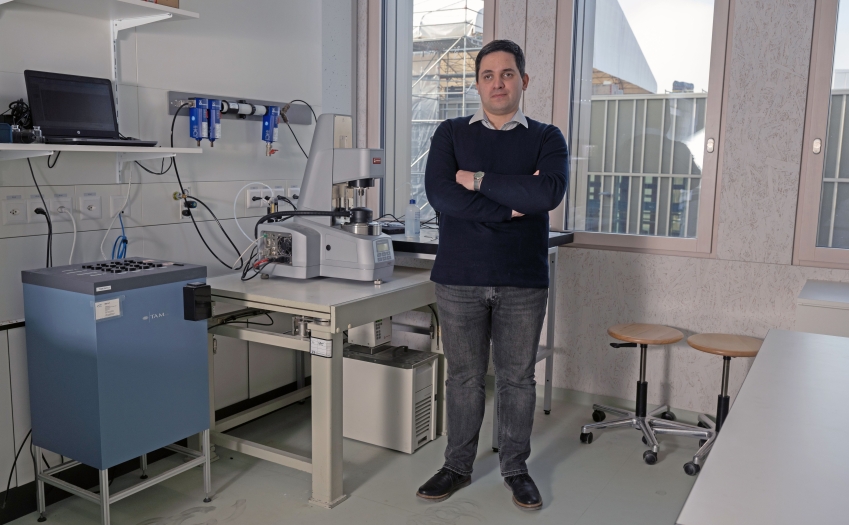News

Interview with Dr Franco Zunino, 2023 RILEM Colonnetti medallist
Dr Franco Zunino is working as an independent scientist at ETH Zürich, Switzerland, on a project aimed at developing a new generation of low-carbon concrete formulations (namely ultra-green concrete). He became RILEM member in 2018. He is one of the two 2023 RILEM Colonnetti medallists. The presentation of Dr Zunino at the Colonnetti award ceremony during the RILEM Spring Convention this year, in Rabat, Morocco, titled “A pathway to low-carbon, high performance concrete” is available here. The 2023 Colonnetti paper of Dr Zunino A two-fold strategy towards low-carbon concrete is published in RILEM Tech Lett, OPEN ACCESS!
28 March 2023
***
Daniela Ciancio – RILEM Implementation Manager (RIM): Let's start with my first question: why did you become ACI member in 2012 and RILEM member in 2018?
Dr Franco Zunino (Franco): in 2012 I was still a bachelor student!
RIM: Tell me more about this, please.
Franco: Well… as I said, at that time I was still a bachelor student at the Pontificia Universidad Católica de Chile. I started my bachelor in civil engineering in 2008. By 2012 I was in my last year of Bachelor starting my master. But, actually, I got involved with cement and concrete science when I was in my second year of Bachelor of Civil Engineering. That was the year when I took a course which is called “materials of civil engineering” in my university… and that was the catch! I started doing research as a bachelor student even before starting my master; my first paper was published when I was still a bachelor student with my supervisor at that time, Professor Mauricio Lopez, in Chile. He was very active in ACI. We went together to an ACI Convention and after that I became a member of ACI. I knew about RILEM, but it looked a little bit further away than ACI in the Americas.
RIM: And then you joined EPFL in 2016 and I guess RILEM became a much stronger reality then for you.
Franco: Exactly! Very suddenly I had to switch my very American-centric kind of academic line of thinking to the European one, but I didn't become RILEM member immediately. With Karen (Editor’s note: Prof. Karen Scrivener, Franco Zunino’s PhD supervisor), we attended the International Conference of Super Plasticizers in 2018 that was organised in Beijing. We had a presentation in that conference and there was a student competition that I won. This event was co-sponsored by RILEM. So… this was the time when I said “OK, this is the moment to become a RILEM member”. And honestly speaking, I became fully active in RILEM and I left behind ACI for a few years. Which is something that I am trying to compensate now.
RIM: Was 2022 the first time that you applied for the Colonnetti medal?
Franco: The second. I think it's kind of natural to apply more than once if you do not get it at the first time. My message for the future applicants would be “Apply as soon as you feel ready to do so. And if you are not successful the first time, keep trying! Because every year you are summing up additional accomplishments and that can make the difference for the selection committee”. I think that the difference between my first application and the application in 2022 was that in 2022 I applied as an independent scientist. See, there was an important transition for me.
RIM: Why working on concrete?
Franco: Because it might not look like very sexy or appealing as a scientific field, but we need to fight against that because I'm convinced that concrete is the most important material of all. And as such, in my view, the smartest civil engineering students should be coming to help us and to use their mind and their brain to develop solutions for the sustainable transition and revolution that we need in this industry. This is in a sense what happened with me with my professor in Chile… I was caught by this subject in the second year of my Bachelor in civil engineering. We need to be able to reproduce this with the new generations of civil engineers and material scientists.
RIM: Talking to a broader audience, not only civil engineers, about your research… what would you say?
Franco: The message should be that concrete, which is this grey and sometimes visually unappealing material that we use to build our cities, our roads, our infrastructure, our connectivity, is the most important material not because I work on it but because we use so much of it, and we will still need a lot of it in decades to come. It's a very good material. It's actually a very sustainable material, but we use a lot of it. So, we are called to develop solutions to transform this concrete industry to a lower carbon version, which is what we need. No matter what you do, you will have to deal with cement and concrete at some point, so it should be something that we are all concerned about. I think that the interest is picking up, which is good. What we need now is more hands, and we need good students, and we need good people to come and help us: to do all the research that's going to be required to sustain this transformation over time.
RIM: What are you doing specifically to sustain this transformation in your research?
Franco: The project that I'm working on now has a name: Ultra green Concrete. The idea is basically to show an alternative of producing concrete differently… because I'm not claiming that this is the only way to do it. The whole centre of the message revolves in the idea, in my opinion, that we got very centric in cement in the last 1015 years. We talk a lot about reducing the clinker factor. We're forgetting that cement is actually not a construction material. The construction material is concrete and while reducing the clinker factor is very important, there are several other aspects on a concrete mixture that influence the CO2. This project is trying to bring the spotlight onto concrete.
RIM: You did a very successful ROC&TOK webinar last year in English. Maybe you could give one in Spanish?
Franco: I'm happy to do one! I'm very happy about what RILEM is doing, that is, making their material available in Spanish too (Editor’s note: and Chinese too).
RIM: … and you can also have a sub-committee in a language different from English, too! As long as there is a sub-committee Chair fluent in English that can report to the TC Chair and Deputy-Chair.
Franco: I think it's an interesting strategy to approach different regions. Africa, India, Southeast Asia, Latin America: these are the areas that are going to consume most of the concrete in the next 3 decades. We need to provide solutions to enable the development of African cities: this is something that I've learned by interacting with so many African students through the doctoral school that we organise every year at the EPFL. They are very willing to receive help and to learn embracing sustainable technologies, but there is a fine line between coaching and patronising. I hope to be able to contribute by putting knowledge and tools in their hands so that they can face their development challenge in a better way than what we have done already in the Global north.
RIM: Very wise, Franco! Thank you so much for this interesting interview!
Franco: That's good. Thank you.














No comment
Log in to post comment. Log in.